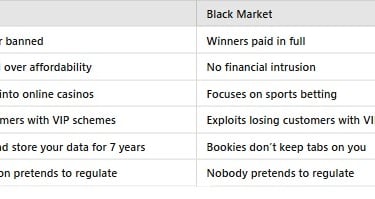Why Shouldn’t I Bet on the Black Market?
Explore the crucial question of whether the gambling commission is fulfilling its duty to protect punters. Understand the implications of gambling regulations and their impact on player safety.
SPORTHORSE RACING
Ed Grimshaw
2/13/20254 min read


Let’s cut to the chase: if you’re a responsible, sensible punter, the so-called "regulated" bookmaking industry does not want you.
If you win too often? You’re restricted or banned.
If you play sensibly? You’ll be nudged towards online casinos instead.
If you’re reckless and losing? The bookies will do everything to keep you playing.
And overseeing this mess with all the authority of a hall monitor who lets the school bullies run riot is Andrew Rhodes, head of the Gambling Commission (GC). His grand regulatory "solution" isn’t to protect punters from predatory bookmakers—it’s to introduce affordability checks that treat small-stake bettors like money launderers while allowing bookmakers to continue their worst excesses unchecked.
The result? A six-fold increase in punters turning to the black market. And who can blame them? If the "regulated" market is just as unfair, why not go elsewhere?
Terms and Conditions: A Charter to Ban Winners and Winning Bets
The biggest myth about modern betting is that bookmakers take all bets fairly. They don’t. In fact, if you actually win—even just a little—you will be banned, restricted, or forced to place stakes so low that your winnings won’t cover a pint.
Why? Because bookmakers don’t want gamblers—they want losers.
Every bookie’s terms and conditions—those endless legalese documents that no one reads—are basically a charter to ban winners whenever they feel like it.
If you win consistently, you’re flagged as a “problem customer.”
If you beat the closing odds, you’re restricted.
If you try to place bets in a calculated way, you’re marked as an “arber” and shut down.
The GC could intervene. It could force bookmakers to take bets from all customers at fair stakes. But it won’t. Instead, it lets bookies restrict or ban anyone who isn’t a walking cash machine.
Meanwhile, if you lose thousands on an online casino, no restrictions, no affordability checks, no problem.
Data Mining: Bookies Store Your Data for Seven Years, But the GC Doesn't Care
Bookmakers aren’t just banning winners—they’re tracking, profiling, and manipulating every customer who places a bet.
Every bet you place is logged.
Your deposit and withdrawal patterns are recorded.
Your spending habits are analysed.
Your betting tendencies are used to predict your future losses.
And guess what? The GC lets them store this data for seven years.
That’s seven years of every bet, deposit, and withdrawal being mined, examined, and used to maximise their profits. And does the Gambling Commission step in to protect your privacy? Of course not. In fact, they allow it to happen.
Affordability Checks: The GC’s Most Pathetic Policy Yet
If you thought the GC might actually crack down on these predatory practices, think again. Instead, they’ve introduced affordability checks—a policy so boneheaded it would make even the most clueless government bureaucrat blush.
Want to place a £20 accumulator? Better hand over your bank statements.
Want to bet on the Cheltenham Festival? Be prepared to explain your life savings.
Want to drop £10,000 on a weekend bender in a casino? No checks required.
This is a policy so backward, so illogical, that it’s actively driving punters away from licensed betting operators and into the arms of black-market bookmakers who won’t interrogate them over a tenner.
Six-Fold Increase in Black Market Betting—But the GC Pretends There’s No Problem
The numbers don’t lie. Since these ridiculous affordability checks were introduced, there has been a six-fold increase in punters using the black market.
And yet, the GC denies there’s a problem. They claim there’s "no evidence" of a black-market surge—even as punters flock to WhatsApp groups, Telegram channels, and offshore websites where they can actually get a fair bet on.
Lee Mottershead and the Racing Post: The Ultimate Hypocrisy
And speaking of clueless denials, let’s talk about Lee Mottershead of the Racing Post—who recently decided to play the role of a glorified informant, "exposing" a WhatsApp betting group as if he’d uncovered an international money-laundering ring.
Mottershead might think he’s being clever, but the reality is, he and the Racing Post have spent years standing by while punters get screwed.
They watched bookies ban winning bettors and said nothing.
They saw affordability checks drive punters away and stayed silent.
They took the bookies’ pieces of silver in the form of advertising revenue, then acted surprised when punters turned to the black market.
The Racing Post isn’t a voice for punters—it’s a mouthpiece for the bookmakers. They’ve enabled this broken system, and now they’re pretending to be outraged when punters seek alternatives.
A Broken System That Won’t Fix Itself
The Gambling Commission has:
Allowed bookmakers to restrict winners while exploiting losers.
Introduced affordability checks that punish small-stake punters while letting bookies push online casinos.
Permitted bookmakers to track, store, and mine punters' data for seven years.
Ignored a six-fold increase in black market betting.
Done nothing to force bookies to take fair bets.
Meanwhile, the BHA, Racing Post, and so-called "racing journalists" like Lee Mottershead have stood by, too scared to bite the hand that feeds them.
So again—what’s the point of staying in the regulated market?
If the legal bookies won’t let you win, if the GC won’t protect you, if the racing industry won’t fight for you, and if the black market offers the same protections (which is to say, none)—why shouldn’t punters go elsewhere?
And unless something changes, that’s exactly what they’ll do.
